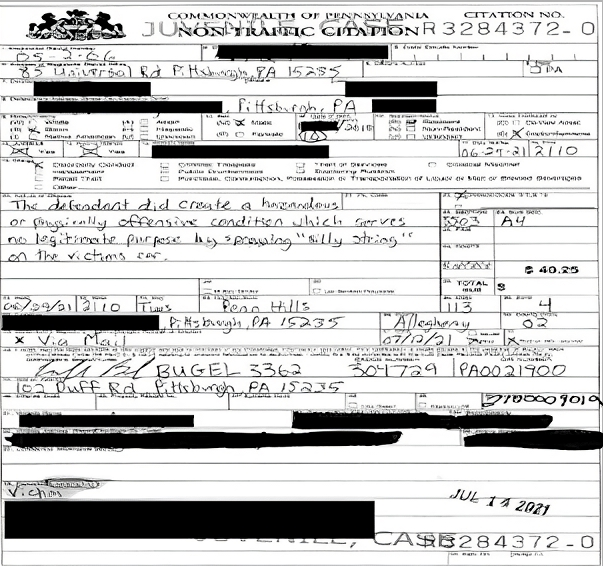What are Summary Citations?

Cops in schools are criminalizing children as young as ten for normal childhood behaviors. We want the school to deal with them, not the cops. The obvious alternatives to this are access to counseling, teachers trained on how to deal with student behavior, and principals working with parents. The criminalization of children leads to lifelong consequences, whether it be fines they can’t afford that never go away, default judgments because they weren’t notified of their court date, or missing out on opportunities because they have a record.
What Can Summary Citations Be Issued for?
Disorderly conduct
Littering
Loitering
Harassment
Trespassing
Criminal mischief
Vaping/smoking
Obscene language
Examples of conduct that can lead to these citations in schools include: a child refusing to come inside from recess, which leads to a trespassing citation; a child spraying silly string inside the school results in a disorderly conduct citation.
What to do if you Receive a Summary Citation
If you sign your citation, you are pleading guilty. This decision comes with punishment in the form of fines, community service, or the Diversion Program.
If you choose to ignore your summary citation, it will be considered an automatic decision of guilty.
The last option is to request a hearing in an effort to “fight” your charges. See the appeals section for more information.
Fines and Fees
Under Pennsylvania law, a Non-Traffic Summary offense is a crime under the crimes code. Upon conviction, an individual may face a fine of up to $300, receive mandated community service, or in some cases be sentenced to up to 90 days imprisonment. For juveniles, fines and community service are more commonly used.

Appeals and Expungements

An appeal is always an option–even if you receive a default judgment because you didn’t show up or you lose your case. The amount of time you have to file an appeal is based on which county issued the citation. A lawyer is not required for this process but is highly recommended. Regardless of how you choose to proceed with an appeal, it is costly to miss work, hire lawyers, or pay the fees for submission. If you cannot afford to appeal, we recommend contacting your local county courthouse.
Expungements, on the other hand, are not automatic. If you are found “not guilty”, you can file to expunge the citation at any time. If you are found “guilty”, you must pay the fines associated with your offense, remain arrest free, and after a statutory time period (based on county) has passed you may begin filing for expungement. If you are a juvenile with a summary citation, we recommend hiring an attorney to expunge your citation.
How are Summary Citations Being Given in Schools?
Summary citations are given out by school resource officers and school police officers. School resource officers are law enforcement personnel who work for the local police department but are assigned to a school (or multiple schools). They have full arrest and citation powers as any police officer would. School police officers are hired by the school but can be given law enforcement authorities by a judge, including arrest and summary citation powers. Some schools also have security officers or private school security. These individuals cannot give citations as they are not law enforcement.

How did Summary Citations Come About in Schools?
Cops in school are a relatively new development and the rise in popularity is the result of multiple phenomena and politics. A national frenzy around crime and the war on drugs in the 90s lead to a rise of spending for police. In 1994, a crime bill was passed which made federal money particularly important in funding police departments in schools. In 1999, the tragic mass shooting at Columbine High School drew national attention and the Department of Justice created a grant program which would award large amounts of money to police departments and school districts. At the same time, states were giving school police more power and funding. With more cops in schools, children’s behaviors are policed and sometimes are given summary citations.
